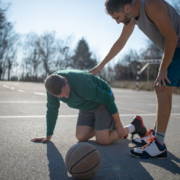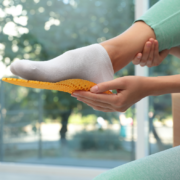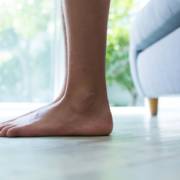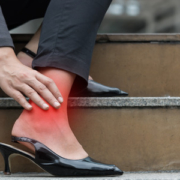Fouling Out: 5 Game-Stopping Basketball Foot Injuries
The NBA finals are here, which means summer leagues, AAU, and intense training sessions are upon us. We at Carrollton Foot Center understand that basketball is a fast-paced sport that demands a lot from your feet all year round.
Whether you’re a seasoned player or just starting out, learning common basketball foot injuries and proper foot care is essential for staying healthy and hitting those jumpers this summer. That’s what this blog’s about.
Common Basketball Foot Injuries
The constant jumping, stopping, and changing directions on the court carries a risk for various injuries:
- Ankle Sprains: This is perhaps the most common basketball injury, occurring when the ligaments in your ankle overstretch or tear. It can happen due to landing awkwardly, stepping on someone’s foot, or rolling your ankle outwards. Symptoms include pain, swelling, bruising, and difficulty walking.
- Plantar Fasciitis: This painful inflammation of the heel is often linked to repetitive stress from activities like basketball.
- Achilles Tendonitis: Even legends such as Kobe Bryant have experienced issues with their Achilles. Overuse or tight calf muscles can irritate this tendon, causing pain and stiffness, particularly in the back of your heel and ankle.
- Stress Fractures: These tiny cracks in the bones of your foot can develop from repetitive stress, especially in athletes who increase their training intensity too quickly.
- Ingrown Toenails: Tight-fitting basketball shoes can put pressure on your toes, increasing the risk of ingrown toenails that dig into the surrounding skin, causing pain, redness, and swelling.
Essential Foot Care for Basketball Players
- Invest in high-quality basketball shoes that provide adequate support, cushioning, and stability for your feet. Choose shoes specific to your playing position.
- Regularly consulting a podiatrist can be highly beneficial, especially for athletes. They can assess your feet, identify potential problems early on, and recommend orthotics or other preventative measures.
By incorporating proper foot care practices into your routine, you can significantly reduce your risk of injuries and keep your feet healthy for optimal performance.
Consult with Board-certified podiatrist Dr. Naghmeh Lilly Khavari, a well-respected expert who is eager to assist her patients in Denton, Dallas, and Collins Counties. She treats a vast array of issues, from ingrown toenails to plantar fasciitis. Call Carrollton Foot Center’s office (located in Carrollton, Texas) at (469)-998-3668 to book your initial consultation today!






